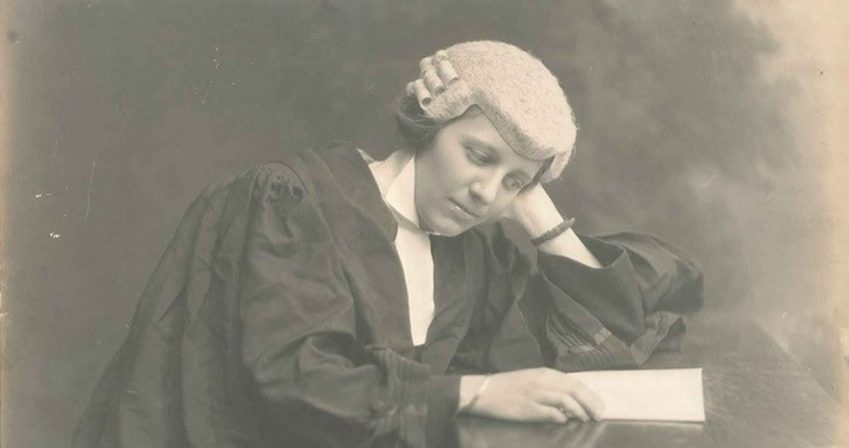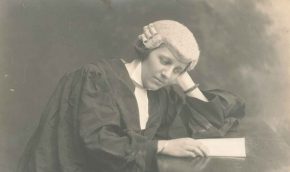The first woman, together with Averil Deverell, to be admitted to the Bar in Ireland in 1921
Women in Law
- Introduction
- Timeline
- Joyce Bamford-Addo
- Marion Billson
- Jill Black
- Elizabeth Butler-Sloss
- Sue Carr
- Eugenia Charles
- Lynda Clark
- Freda Corbet
- Coomee Rustom Dantra
- Leeona Dorrian
- Heather Hallett
- Frene Ginwala
- Rosalyn Higgins
- Daw Phar Hmee
- Lim Beng Hong
- Dorothy Knight Dix
- Sara Lawson
- Elizabeth Lane
- Theodora Llewelyn Davies
- Gladys Ramsarran
- Lucy See
- Evelyn Sharp
- Victoria Sharp
- Ingrid Simler
- Teo Soon Kim
- Ivy Williams
- The Significance of the Sex Disqualification (Removal) Act 1919
- Podcasts
Home › Women in Law › Pioneering Women in Law › Frances Kyle
Frances Kyle
Frances Christian “Fay” Kyle was born in Belfast on 30 October 1894, Fay was the youngest of two daughters of Robert Alexander Kyle, owner of a high class outfitter/ drapers, and his wife Kathleen Frances née Bates (c.1867-1930). Initially educated at home by a French-born governess, she and sister Kathleen (1890-1965) went to a Belfast ‘Dame School’, followed in 1905 by boarding school in Poitiers, France. In 1906 the sisters were separated – Kathleen to board at Wycombe Abbey, and Fay to a finishing school in Switzerland. Both sisters then went to Trinity College, Dublin: Fay got an LLB in 1916 (having got a BA in 1914, coming first in French in 1913, and passing an exam in Astronomy in 1915). Kathleen, who was involved in suffrage, graduated LLB in 1914, but married in 1918 and pursued her literary connections. Both were longstanding members of the women postgraduates’ associations, attending a 1930 dinner in Belfast with Helena Normanton. In January 1920, (reluctantly) following the 1919 Act, the King’s Inns Benchers passed a resolution admitting women to read for the Bar on the same terms as men. Fay enrolled in January 1920 with Averil, the first ever King’s Inns women students, came first in the continuous course exam and got the Victoria prize in the Senior class. She then took first place in the Bar finals, and was the first woman to be awarded the John Brookes Scholarship in October 1921. That brought her an exemption, the Benchers agreeing (by just six votes) to excuse her compliance with part of the rules.


Frances in wig and gown, with kind permission of Professor Senator Ivana Bacik, Trinity College Dublin (from 'Gender Injustice - Feminising the Legal Professions?' Bacik, Costello & Drew, Trinity College Dublin Law School 2003)
On 1 November 1921 Fay and Averil were called to the Irish Bar by Sir Thomas Molony, Lord Chief Justice of Ireland, at the Four Courts in Dublin. The first call day of an Irish Bar now divided into separate jurisdictions for Dublin and Belfast, they were the first called in the UK (Ireland was still included as the Anglo-Irish Treaty was signed later). The serious looking Fay was the first called, having beaten 18 men: second was John Clarke MacDermott, later Lord Chief Justice of Northern Ireland. A week later, at the first Call ceremony to be held in Belfast’s Crumlin Road courthouse, she and MacDermott were called to the Northern Ireland Bar, having decided to play safe in the confusion over whether the Dublin Call would be effective in the North. Fay returned to live in the family home in Belfast, subscribed to the new Bar Library, and joined the new Northern Ireland circuit. In compliance with the terms of the John Brooke scholarship, she did practise, receiving her first instructions in February 1922, with two High Court appearances in March 1922. In May 1922 in London, expressing doubts to a Daily Mail reporter about making a living, she revealed legal friends had advised her to stick to conveyancing: but she believed she should prepare the way for those to follow. Duly elected as a member of circuit on 14 June 1922 (the first in Ireland or England), and listed in Thom’s Law Directory until 1931, her name remained on the circuit list until 1939. However, unlike the Deverells, the Kyles had had no lawyers in the family for several generations, and it seems poor physical health undermined Fay’s early promise. The only evidence of any court appearances after 1922 was one in 1937 in Belfast to defend her own parking summons: she relied, (unsuccessfully), on ‘literary research in the Linen Hall Library’.
She chose a life of culture and travel, documenting her regular journeys to France and Italy with family, and friends such as the Shackleton Heald sisters, in entertaining correspondence. Her aunt Georgina Moutray Kyle (1865-1950), was a well known artist, with 1920s and 1930s exhibitions in Paris and Ireland. Channelling her intellectual brilliance into conversation, letters, music and languages, Fay held a small salon in her Belfast home. A skilled violinist and linguist, she was fluent in French and able to read philosophy and literature in several European languages. During World War II she provided hospitality and support for servicemen, setting up language classes for the Ulster Troops Library Scheme while herself learning Czech. For many years at the Belfast family home with her sister and family, and their widowed father, in 1944 she followed the recently widowed Kathleen to London, living with her in Hampstead. In increasing ill health, she died of cancer at the London Clinic on 22 June 1958 aged 64.